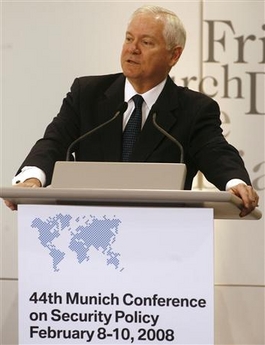Gates says two-tiered NATO puts alliance at risk
Updated: 2008-02-11 09:16
MUNICH - Defense Secretary Robert Gates said on Sunday the NATO alliance was at risk if it became split between members willing and unwilling to fight as he appealed to Europeans to support the war in Afghanistan.
While admitting US policy mistakes -- and his own role in one of them -- Gates urged the allies to come together in the fight against Islamist militants in Afghanistan and said the credibility of NATO itself was at stake.
"We must not -- we cannot -- become a two-tiered alliance of those who are willing to fight and those who are not," he told a gathering of security and military experts in Munich. "Such a development, with all its implications for collective security, would effectively destroy the alliance."
His speech was the latest move in a campaign he has undertaken -- sometimes quietly, sometimes through blunt public statements -- to persuade NATO allies to supply more troops and resources for the mission.
While France, for example, has indicated a willingness to send more troops, Germany has been adamant it cannot do more.
Gates said NATO could not afford "the luxury" of letting some nations conduct less dangerous missions while others did more fighting and dying -- a remark which appeared aimed at Germany, whose forces are in the safer north of Afghanistan.
Chancellor Angela Merkel defended Germany's engagement in a newspaper interview published on Sunday, and confirmed the country would not alter its mission in Afghanistan, despite a report in the weekly Der Spiegel on Saturday that said Germany was planning to expand the number of soldiers by 1,000 to 4,500.
"We've got a strong engagement with our responsibilities in the north," she told the Hamburger Abendblatt newspaper, adding "it's not the case that 'nothing is going on there'."
"We approved a mandate in parliament just a few months ago for the operation and that remains valid until October. Nothing about that will be changed."
Several German politicians criticized Gates after his speech, with one accusing him of public "finger pointing," but the Pentagon chief said he had not meant to single out specific countries and called Germany "a little overly sensitive."
"This is a problem that the alliance has, not that any individual country has," Gates said. "The finger was never pointed in Germany's direction."
"False success"
Gates expressed concern that Europeans did not fully comprehend the threat posed by Islamic extremism to the continent, conceding public support for the war was weak here.
|
|
|
||
|
||
|
|
|
|


